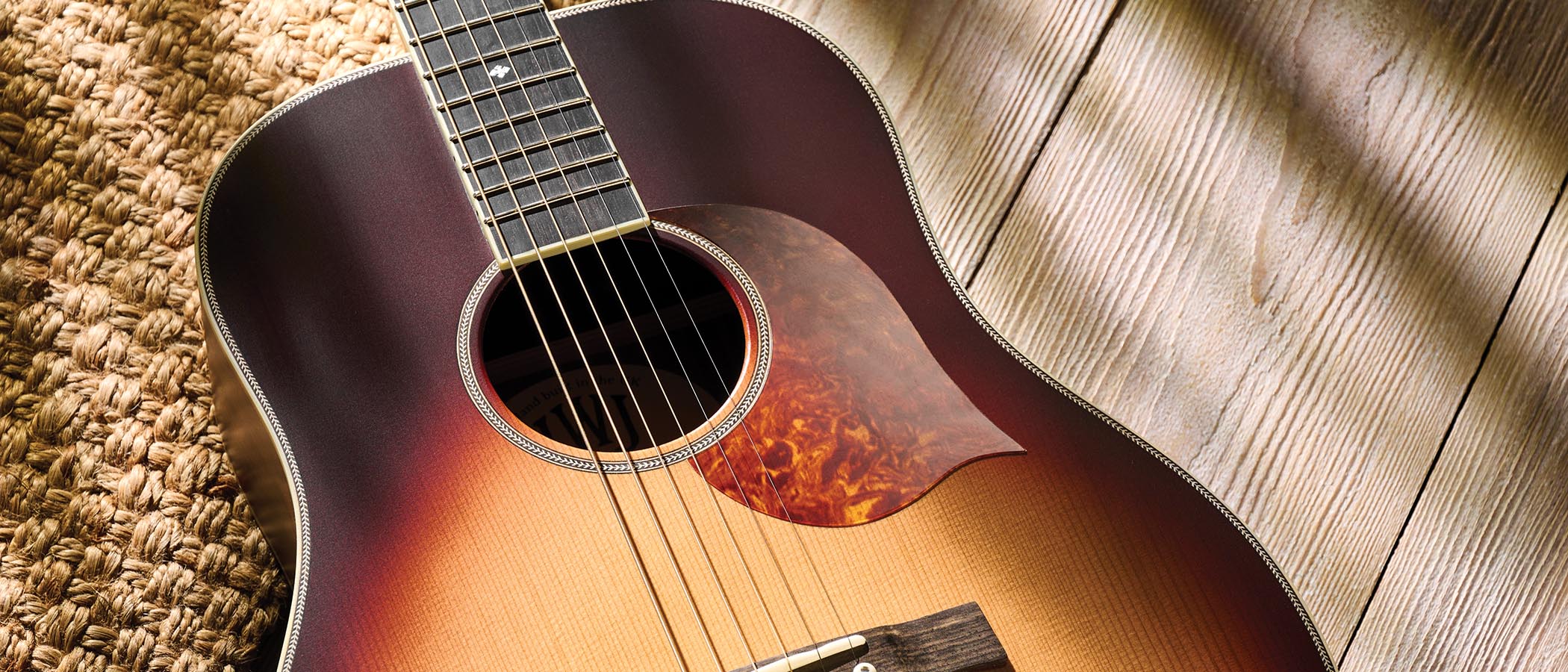Dave Davies shares his 14 favorite tracks from across the Kinks’ two classic early ‘70s records
'71's Muswell Hillbillies and '72's Everybody’s in Show-Biz are essential listening for any music fan. Here, Davies revisits the two LPs, which captured the band just as they entered their most experimental era

All the latest guitar news, interviews, lessons, reviews, deals and more, direct to your inbox!
You are now subscribed
Your newsletter sign-up was successful
For Kinks guitarist Dave Davies, revisiting the seminal British band’s 1971 album, Muswell Hillbillies, and 1972’s Everybody’s in Show-Biz with his brother – vocalist/guitarist Ray Davies – for a recently released pair of box sets was a tiring yet eye-opening endeavor. “I’ve never subjected myself to so much Kinks music in such a short space of time,” he says. “It made me realize how hard we worked. I couldn’t do it like that now. Touring schedules are really hard work.”
The process also gave him a chance to revisit the start of the band’s most experimental era of music making. In the early '70s, the Kinks were going on months-long stretches of touring the globe and enjoying immense popularity off hits such as You Really Got Me, Lola, Apeman and Sunny Afternoon.
That time on the road inspired the band to look into new genres of music, and when it came time to record Muswell Hillbillies, they decided to draw from their American influences, mainly country and blues. “A lot of the guitar playing was based on what I’d learned from American country music,” he says.
Up next was the much more experimental Everybody’s in Show-Biz, a double album that marked a true transition for the band. The Kinks had been friendly with UK jazz musician Mike Cotton – and several other jazz players – since the early '60s, and they felt it was time to tap into some of that influence and experiment with “a bit of Dixieland and a bit of New Orleans jazz,” Davies says.
“I think it was a step in that direction,” he reflects. “Whether it was the right one or wrong one, you don’t know until you do it, but I think it helped us a lot. Sometimes expanding new ideas helps you as a musician; I think Ray wanted to experiment more than I did. The guys in the brass section were funny. They were bright and clever, but they were funny. Humor can sometimes provide different layers to tracks, and you can create a lot of humor in tonal qualities in certain instruments like the tuba.”
Despite the changes – and yes, there are tubas present on Everybody’s in Show-Biz – guitar remained a vital part of the Kinks’ sound. The band’s core remained the basic rock setup of guitar, bass and drums. “Then you got embellishments with the keyboards and a brass section that helped implement different arrangements,” Davies says. “But still the heart of it is a rock ’n’ roll live record, mainly.”
Davies recalls using a lot of open tunings on his ’54 Stratocaster and doing the bulk of the slide work on his Martin. “You’re using the same guitar to do different parts and the finger picking,” he says. “It’s really only three guitars I can recall that I used – my ’54 Strat, a Tele and my Martins. Obviously, Ray used a Dobro for certain things, and there were other acoustic guitars that we used.”
All the latest guitar news, interviews, lessons, reviews, deals and more, direct to your inbox!
Here, Davies dissects some of his favorite tracks from these two stand-out entries to the band's discography.
Dave Davies Favorite Tracks From: Muswell Hillbillies
20th Century Man
“One of my favorite Ray songs. It’s an important song, not just on this album, but any album, and it’s still valid today. It’s a very perceptive track with a great feel. It was a privilege to be a part of it. We were trying to get a sort of thoughtful, 'Well, what’s going to happen?' kind of mood and to keep the instruments more subdued. That’s where I thought the slide guitar came in handy, and it really changes the mood.
“As with all of the tracks on Muswell Hillbillies, one of the reasons I used slides a lot was because it evokes a different feel – not nostalgic but wondering. The slide gave you a sense of wonder. The important thing about the arrangement that we used on the master is that it’s kind of [an] undercurrent, underplayed. A track like that needs that underplaying.”
Skin and Bone
“That’s a very typical, Kinks-like track. We liked to try and keep our humor in the music. It’s funny, and it’s about the time in that era before people really worked out in the gym like they do today. People didn’t go to the gym much. So dancing was the main thing: dancing and exercising. It’s got a funny chorus.”
Complicated Life
“It’s a reminiscence about, whatever you do, life is complicated. I used the slide to get a feeling of pondering what can happen. That’s one of my favorite tracks, and it’s simple as well. Sometimes you can say it a lot more in the simple configuration than you can [when] trying too hard.”
Here Come the People in Grey
“It reminds me of a comedy track called They’re Coming to Take Me Away, Ha-Ha! [Napoleon XIV, 1966]. That was going through my mind as we were working out the vocal parts, but there’s some great sections in that song.
“I love it when the electric guitar’s holding it together at the beginning and the drums come in. It sets a really good rhythm… There’s a point toward the end where it kind of speeds up. It’s really cool.”
Holloway Jail
“All these characters in these songs were actually based on real people. The area near Holloway [in London] was where my family came from. There’s an area called Caledonian Road. It’s a road that leads right toward Kings Cross, and it goes by two prisons. There’s Pentonville Prison and Holloway Jail. It’s just reflections on society then, when we were growing up.
“I could play that country style, what I call [my] version of a country vibe… I used open picking and the slide. We used several guitars, a Telecaster tuned to D and a Stratocaster – an old Strat from 1954. I had that guitar for years. I don’t think I’ve got it anymore. I loved that guitar. A lot of the slide work was done on my Martin D-... [Pauses] It was a Martin D-something!”
Muswell Hillbilly
“There’s that love and fondness for Americana and for country music because I had quite a big family, and all the great films like South Pacific and Oklahoma! – all these influences from the States – were embedded in our culture when growing up. It was kind of like a London version of The Beverly Hillbillies in a humorous way.
“We had so many influences from America as we were growing up and learning guitar. They were mostly American music influences, like country. Hank Williams had a great band with slide and fiddle. What a great band. We were lucky we had some great musical influences to draw on.”
Traveling with My Band
“It’s Ray’s tribute [to touring]. I like it. It’s nice and self-explanatory.”
Dave Davies' Favorite Tracks From: Everbody's in Show-Biz
Here Comes Yet Another Day
“That’s a funny track. It’s very much like what happens when you’ve been on the road, because a lot of the album is about being on the road, and all these towns you’re going to go through – Miami one day, San Francisco the next, then Chicago, then New York – it’s all about waking up in a new place every day. It’s an interesting song.”
Unreal Reality
“When you’re on the road, it is an unreal reality. It’s like you’re living in a dream, but it’s real. It’s an unreal reality, just touring. Every day you’re in a different place, and it can be a bit of a nightmare.”
Sitting in My Hotel
“It goes back to the touring thing [again], and every day you’re at parties and the shows. You come back home to get a few hours’ sleep before you start again. The rigors of touring. Every day’s different, but it’s the same.”
Motorway
“That’s yet another great observation raised [about touring] – uncanny observations about what’s going on. I think it’s really, really good at that.”
You Don’t Know My Name
“I was going through a tough time emotionally during ’71, early ’72, and it came to a head toward the end of that tour. I felt psychically, spiritually and emotionally kind of crippled in a way. My mental health was horrible. Then, really, [there were] the inner-observations I had about my own life.
“Sometimes you feel so crazy. You’re rushing around, getting on planes and trains. You sometimes even question your own sanity. Is it me? Does anybody know my name? Who am I? Weird and wonderful – but a crazy world.”
Supersonic Rocket Ship
“I have a special love for that track because it’s got a great optimism about it. It’s also got a lot of sarcasm. It’s a lovely blend of [both], plus reality and dysfunction – but also hope.”
Celluloid Heroes
“One of my favorite songs ever, by anybody. I remember when we were just starting out down the road with tidying up the lyrics. That really filled me with a lot of emotion because it is quite an incredible idea anyway, all those [movie] stars, names and handprints being on those stars. There are all these great stars immortalized on pavement, in concrete.
“Funny enough, I think one of my favorite versions of that song is a live version that’s not on the album, and it’s got a standard guitar solo at the front. Hopefully, we might put it out on a later release. I used my Martin mainly on that, and it’s simple. Keep it simple and effective.”
Josh is a freelance journalist who has spent the past dozen or so years interviewing musicians for a variety of publications, including Guitar World, GRAMMY.com, SPIN, Chicago Sun-Times, MTV News, Rolling Stone and American Songwriter. He credits his father for getting him into music. He's been interested in discovering new bands ever since his father gave him a list of artists to look into. A favorite story his father told him is when he skipped a high school track meet to see Jimi Hendrix in concert. For his part, seeing one of his favorite guitarists – Mike Campbell – feet away from him during a Tom Petty and the Heartbreakers concert is a special moment he’ll always cherish.












